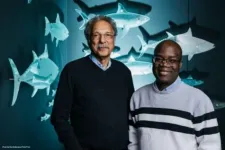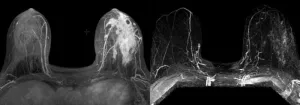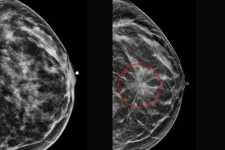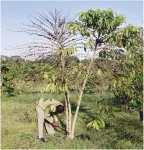(Press-News.org) The Africa-UBC Oceans and Fisheries Visiting Fellows Program is extremely pleased to announce the selection of its inaugural laureates: Dr. Cynthia A. Adinortey (Ghana) and Dr. Antony Otinga Oteng’o (Kenya).
“We had many excellent applicants from across Sub-Saharan Africa. Ultimately, our Selection Committee selected these two exemplary scholars, and we are most happy with the result,” said Dr. William Cheung, professor and Director of UBC’s Institute for the Oceans and Fisheries (IOF), which administers the Program. “These two exemplary scholars will now have the opportunity to collaborate with researchers at UBC, access the vast resources available here, and create insights that will benefit their universities, their countries, and the world.”
The Africa-UBC Visiting Fellows Program came about as the brainchild of IOF’s Drs Rashid Sumaila and Daniel Pauly, the co-winners, in 2023, of the prestigious Tyler Prize for Environmental Achievement. These professors, both of African descent, have been working with scholars from that continent for many years and felt there were too few opportunities for talented early-career academics from sub-Saharan African universities and research institutes to participate in mutually beneficial research collaborations and build international networks. This Program was developed with the assistance of the University of Cape Coast.
“The University of Cape Coast is proud to support the Fellows Program, which strengthens the collaboration between African researchers and global academic communities,” said Professor Denis W. Aheto, Professor of Coastal Ecology and Director of the Centre for Coastal Management, The Africa Centre of Excellence in Coastal Resilience (ACECoR), University of Cape Coast. “It is vital that we continue to foster these partnerships to address the challenges facing Africa's oceans and fisheries, ensuring sustainable solutions for future generations.”
“Rashid and I have strived to work on a global basis, with emphasis on the Global South, and build connections with researchers across all continents,” Dr. Pauly said. “Welcoming Drs. Adinortey and Oteng’o in Vancouver, through the Africa-UBC Oceans & Fisheries Fellowship, will strengthen our ongoing collaboration with African scholars and, ultimately, support efforts towards the conservation and sustainable management of the continent’s marine and freshwater resources.”
“The Program is open to researchers across all academic fields, who are focused on ocean sustainability and making the ocean economy work for the people who call Africa home”, said Dr. Sumaila. The selected fellows are affiliated with a faculty member at UBC for a 12-month period – 11 months of virtual engagement, with a month visit to UBC’s Vancouver campus. The total value of each fellowship is $23,000 CAD, which covers Fellow and UBC counterpart research funds, the cost of air ticket, accommodation and subsistence during the Fellows’ UBC visit, etc.
The Laureates
Dr. Cynthia Adinortey is a Senior Lecturer at the University of Cape Coast (UCC) in Ghana, whose research focuses on bacterial virulence and antibiotic resistance, with particular attention to food safety and the fisheries value chain, using the One Health collaborative, transdisciplinary approach. She led a USAID/UCC project on antibiotic resistance in Ghana's aquaculture sector and has actively participated in anti-microbial resistance (AMR) awareness efforts as an AMR Insight Ambassador. She was elected an African Academy of Sciences Affiliate in 2022. Since 2017, she has worked with key stakeholders in Ghana's fisheries sector, providing microbiology expertise on major projects, including research on polycyclic aromatic hydrocarbons in fish, the Healthier Smoked Fish Certification Scheme under USAID's Sustainable Fisheries Management Program (SFMP) and the development of the Safe Fish Certification Scheme with Feed the Future Ghana Fisheries Recovery Activity (GFRA).
“I am very excited and honoured to be chosen as one of the two inaugural Fellows of the Africa-UBC Oceans and Fisheries Fellowship Program, and to work on specific research related to the identification of indicator organisms for disease diagnosis in Ghanaian aquaculture,” said Dr. Adinortey. “This research has the potential to improve aquaculture disease management, enhance productivity, and contribute to the sustainability of the aquaculture industry in Ghana.”
“There is an urgent need for targeted scientific research to address the challenges faced by communities in lower-middle-income countries like Ghana. A critical issue is the sustainable management of freshwater resources, not only to increase production but also to protect the environment. Despite the dedication of Ghanaian fisheries scientists, the workforce needed to address emerging issues in the country’s fisheries remains insufficient. There is a clear need for more young scientists committed to solving these challenges and training the next generation of professionals,” Dr. Adinortey said.
“Given the critical role of aquaculture in food security and economic development, the findings of this study could be of significant value to farmers, policymakers, and researchers in Ghana. It is interdisciplinary in nature, cutting across microbiology, molecular biology, bioinformatics, fisheries biology, and fish health, which is why I am also thrilled to be able to work with Dr. Curtis Suttle and Dr. Amy Chan in UBC’s Department of Microbiology,” she stated.
Dr. Suttle is likewise enthused. “Dr. Adinortey’s research is both focused and fascinating. It aligns with my work on the role that viruses and microbes in aquatic systems, and provides an opportunity to explore the discovery and characterization of microbes that cause disease in aquatic organisms in West Africa.”
“So far we have been building our research plan, fine tuning the scope of the research and developing the appropriate experimental design to adopt. For me, it has also provided a great opportunity to build connections with fish and aquaculture researchers in West Africa. I am greatly looking forward to Dr Adinortey’s visit to UBC, which has been scheduled for April 2025.”
Dr. Antony Otinga Oteng’o is a Young Career Scientist, Lecturer and Coordinator of post-graduate program at the Department of Biological Sciences & Agriculture, University of Eastern Africa, Baraton, Kenya (UEAB). With a background in molecular biology and marine plant phylogeny, Dr. Oteng’o’s research interest focuses on species identification, evolutionary relationships, and the critical role that phylogenetic studies plays in informing conservation strategies.
“My fellowship project is entitled, Enhancing Marine Ecosystems and Coastal Communities in Majoreni, South Coast Kenya, is a biodiversity conservation initiative,” said Dr. Oteng’o. Mangroves are vital to the health of coastal ecosystems, serving as nurseries for many marine species, protecting shorelines from erosion, and sequestering significant amounts of carbon. However, these critical habitats are under threat from anthropogenic factors such as deforestation, pollution, and climate change. “By assessing the current state of mangrove forests along the Kenyan coast, I hope to identify the key challenges they face, and develop strategies for their restoration, management and conservation. The intended outcomes are improved food security, reduced coastal climate impacts, improved carbon credit, and increased biodiversity.”
Dr. Oteng’o add that “the project will also explore apiculture (or beekeeping) as a sustainable alternative livelihood for the Majoreni community. Apiculture could not only provide a source of income to the local economy, through the production of honey and other bee products, but will also support biodiversity by promoting pollination.”
“The project will involve collaborating with local stakeholders, including general community, fishers, farmers, conservation groups, and government agencies, to develop and implement effective mangrove conservation and livelihood strategies,” he continued.
He applied for the Visiting Fellows program because he was deeply impressed by the University of British Columbia's commitment to innovative research and its global reputation for academic excellence. “Also, the opportunity to collaborate with Prof. Philippe Le Billon, a leading natural resource expert, and to have access to UBC's extensive resources will significantly enhance my research.”
“Dr. Otengo’s project regarding leveraging mangrove reforestation and apiculture by local communities to increase coastal protection, biodiversity, and food security, is appealing,” said Dr. Philippe Le Billon, who is co-appointed to UBC’s Department of Geography and its School of Public Policy and Global Affairs (SPPGGA). “It could ultimately contribute to the long-term resilience and sustainability of Kenya's marine ecosystems and coastal communities, providing a model for similar conservation efforts around the world.”
“This is why I was eager to participate in this Visiting Fellows Program – to collaborate with a researcher from the region and to be able to create new opportunities and apply innovative solutions to real-world environmental challenges,” said Dr. Le Billon, who has been exchanging ideas with Dr. Oteng’o virtually, and is looking forward to his time at UBC, which is as yet unscheduled.
Appealing to future applicants
“I am truly grateful to have been selected for this unique opportunity to contribute to addressing one of Africa's most pressing challenges: ensuring food security through sustainable aquaculture,” said Dr. Adinortey.
“I encourage all young African scientists in ocean and fisheries research to watch for the next call for applications and seize the opportunity to explore how the ocean economy can be harnessed to benefit not only Africans, but the world as a whole.”
Dr. Oteng’o concurs. “To aspiring applicants, I encourage them to embrace the opportunity to grow, learn and make a difference by applying to the program. I am confident that the Africa-UBC Oceans and Fisheries Visiting Fellows program will provide me with the tools, support, and inspiration needed to achieve my research goals and contribute to the broader scientific community.”
Now accepting applications
The Africa-UBC Oceans and Fisheries Visiting Fellows program has opened applications for its 2025 cohort.
Information on the program, its criteria and how to enter can be found at https://oceans.ubc.ca/applytoafricaubcprogram/ . The deadline for applications is May 15, 2024.
END
Visiting Fellows selected for inaugural cohort of the Africa-UBC Oceans and Fisheries Visiting Fellows Program
The Program's inaugural laureates: Dr. Cynthia A. Adinortey (Ghana) and Dr. Antony Otinga Oteng’o (Kenya)
2024-12-05
ELSE PRESS RELEASES FROM THIS DATE:
Innovative immunotherapy shows promise in early clinical trial for breast cancer
2024-12-05
A groundbreaking phase one clinical trial exploring a novel cell-based immunotherapy for breast cancer has been accepted for publication in JAMA Oncology. The technology tested in the trial was co-developed by Gary Koski, Ph.D., professor in Kent State University’s Department of Biological Sciences, and Brian J. Czerniecki, M.D., Ph.D., chair and senior member in the Moffitt Cancer Center’s Department of Breast Oncology. The study focuses on a new treatment approach that aims to harness the body’s immune system to enhance patient responses ...
Whiteness as a fundamental determinant of health in rural America
2024-12-05
WASHINGTON -- White people in rural America have unique factors that drive worse health outcomes than their urban counterparts, prompting a team of public health researchers to label whiteness as a fundamental determinant of health. They say while the health and well-being of racially minoritized populations should continue to be a research priority they urge researchers to consider factors that influence the health of majoritized populations.
In an analytic essay, "Whiteness: A Fundamental Determinant of the Health of Rural White Americans,” published Dec. 5 in the American Journal of Public Health, Caroline Efird, PhD, MPH, ...
Analyzing multiple mammograms improves breast cancer risk prediction
2024-12-05
A new study from Washington University School of Medicine in St. Louis describes an innovative method of analyzing mammograms that significantly improves the accuracy of predicting the risk of breast cancer development over the following five years. Using up to three years of previous mammograms, the new method identified individuals at high risk of developing breast cancer 2.3 times more accurately than the standard method, which is based on questionnaires assessing clinical risk factors alone, such as age, race and family history of breast cancer.
The study is published ...
Molecular zip code draws killer T cells straight to brain tumors
2024-12-05
More information, including a copy of the paper, can be found online at the Science press package at https://www.eurekalert.org/press/scipak.
Molecular Zip Code Draws Killer T Cells Straight to Brain Tumors
Researchers have found a way to program immune cells to attack glioblastoma and treat the inflammation of multiple sclerosis in mice. The technology will soon be tested in a clinical trial for people with glioblastoma.
UCSF scientists have developed a “molecular GPS” to guide immune cells into the brain and kill tumors without harming healthy tissue.
This living cell therapy can navigate through the body to a specific organ, addressing ...
Engineered immune cells may be able to tame inflammation
2024-12-05
More information, including a copy of the paper, can be found online at the Science press package at https://www.eurekalert.org/press/scipak.
Engineered Immune Cells May Be Able to Tame Inflammation
Immune cells that are designed to soothe could improve treatment for organ transplants, type 1 diabetes and other autoimmune conditions.
When the immune system overreacts and starts attacking the body, the only option may be to shut the entire system down and risk developing infections or cancer.
But now, scientists at UC San Francisco may have found a more precise way to dial the immune system down.
The technology ...
Rapid surge in global warming mainly due to reduced planetary albedo
2024-12-05
Rising sea levels, melting glaciers, heatwaves at sea – 2023 set a number of alarming new records. The global mean temperature also rose to nearly 1.5 degrees above the preindustrial level, another record. Seeking to identify the causes of this sudden rise has proven a challenge for researchers. After all, factoring in the effects of anthropogenic influences like the accumulation of greenhouse gases in the atmosphere, of the weather phenomenon El Niño, and of natural events like volcanic eruptions, can account for a major portion of the warming. But doing so still leaves a gap of roughly 0.2 degrees Celsius, which has never been satisfactorily ...
Single mutation in bovine H5N1 switches viral binding specificity to human receptors
2024-12-05
A single mutation in bovine influenza H5N1 – a clade of the highly pathogenic avian influenza virus that has been increasingly detected among North American livestock herds – can cause the virus to switch affinity from animal-type receptors to human-type receptors, according to a new study. The findings highlight the crucial need for continuous surveillance of emerging H5N1 mutations, as even subtle genetic changes could increase the virus's capacity for human adaptation and transmission, potentially triggering a future influenza pandemic. In 2021, the highly pathogenic influenza H5N1 clade ...
Discovered: the neuroendocrine circuit that dictates when fish are ready to hatch
2024-12-05
Researchers have uncovered a previously unknown yet crucial role for thyrotropin-releasing hormone (Trh) in zebrafish hatching and reveal how this hormone activates a transient neuroendocrine circuit that controls when fish larvae are ready to leave the egg and swim free. For egg-born animals, hatching marks a pivotal shift, transitioning from the sheltered environment of an egg capsule to external conditions. This crucial event is not strictly hardwired into the embryo’s developmental program. Rather, hatching is a regulated ...
Climate change threatens global biodiversity, with extinction risks escalating at higher temperatures
2024-12-05
Climate change is driving global extinction risks, with 1.6% of species threatened at 1.3°C of warming and risks escalating to 29.7% at 5.4°C, according to a new meta-analysis encompassing more than 30 years of research. Climate change is reshaping ecosystems and biodiversity globally, altering species distributions, interactions, and population dynamics. While some species adapt or migrate to track shifting climates, others face population declines, shrinking ranges, and potential extinction. ...
Scientists ‘turn up the heat’ on understanding coffee wilt disease which threatens our favourite daily brew
2024-12-05
Scientists, including those from Imperial College London, University of Oxford and CABI, have ‘turned up the heat’ on how repeated outbreaks of coffee wilt disease threatened arabica and robusta varieties of our favourite daily coffee brew.
The scientists, who present their findings in the journal PLoS Biology, say the fungal pathogen Fusarium xylarioides continues to pose a significant threat to coffee production and incomes across sub-Saharan Africa.
Their work supports earlier findings, based on DNA markers and crossing experiments which suggested that F. xylarioides is ...
LAST 30 PRESS RELEASES:
Scientists discover why we know when to stop scratching an itch
A hidden reason inner ear cells die – and what it means for preventing hearing loss
Researchers discover how tuberculosis bacteria use a “stealth” mechanism to evade the immune system
New microscopy technique lets scientists see cells in unprecedented detail and color
Sometimes less is more: Scientists rethink how to pack medicine into tiny delivery capsules
Scientists build low-cost microscope to study living cells in zero gravity
The Biophysical Journal names Denis V. Titov the 2025 Paper of the Year-Early Career Investigator awardee
Scientists show how your body senses cold—and why menthol feels cool
Scientists deliver new molecule for getting DNA into cells
Study reveals insights about brain regions linked to OCD, informing potential treatments
Does ocean saltiness influence El Niño?
2026 Young Investigators: ONR celebrates new talent tackling warfighter challenges
Genetics help explain who gets the ‘telltale tingle’ from music, art and literature
Many Americans misunderstand medical aid in dying laws
Researchers publish landmark infectious disease study in ‘Science’
New NSF award supports innovative role-playing game approach to strengthening research security in academia
Kumar named to ACMA Emerging Leaders Program for 2026
AI language models could transform aquatic environmental risk assessment
New isotope tools reveal hidden pathways reshaping the global nitrogen cycle
Study reveals how antibiotic structure controls removal from water using biochar
Why chronic pain lasts longer in women: Immune cells offer clues
Toxic exposure creates epigenetic disease risk over 20 generations
More time spent on social media linked to steroid use intentions among boys and men
New study suggests a “kick it while it’s down” approach to cancer treatment could improve cure rates
Milken Institute, Ann Theodore Foundation launch new grant to support clinical trial for potential sarcoidosis treatment
New strategies boost effectiveness of CAR-NK therapy against cancer
Study: Adolescent cannabis use linked to doubling risk of psychotic and bipolar disorders
Invisible harms: drug-related deaths spike after hurricanes and tropical storms
Adolescent cannabis use and risk of psychotic, bipolar, depressive, and anxiety disorders
Anxiety, depression, and care barriers in adults with intellectual and developmental disabilities
[Press-News.org] Visiting Fellows selected for inaugural cohort of the Africa-UBC Oceans and Fisheries Visiting Fellows ProgramThe Program's inaugural laureates: Dr. Cynthia A. Adinortey (Ghana) and Dr. Antony Otinga Oteng’o (Kenya)






